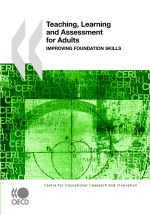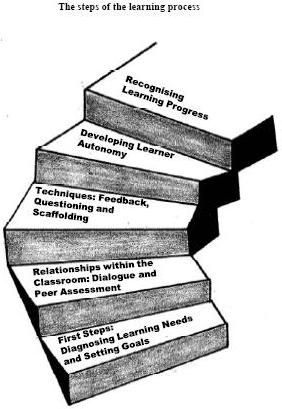Centre for Educational Research and Innovation - CERI
Teaching, Learning and Assessment for Adults: Improving Foundation Skills
Executive summary | Table of contents | How to obtain this publication
|
ISBN: 9789264039902 |
Teaching, Learning and Assessment for Adults: Improving Foundation Skills Adults with low skills in language, literacy and numeracy (LLN) are numerous in many OECD countries. They can include early school leavers, older learners who have not used their skills over time, immigrant and refugee learners, or individuals with disabilities. The consequences of these low foundation skills span the economic, health and social well-being of individuals, families and communities. Investment in this sector of adult education is therefore crucial. But what is known about whether and how programmes are meeting the needs of diverse learners? This study looks specifically inside the programmes for adult LLN learners, with a focus on formative assessment – referring to the frequent assessment of learner understanding and progress to identify needs and shape teaching and learning. Drawing upon evidence gathered in country reports, exemplary case studies and international literature reviews, it examines the impact and implementation of different teaching, learning and assessment practices for adult LLN learners; the way innovative programmes address the very diverse needs and goals of this population; and the policies that support or hinder effective practice. This book provides a strong foundation for understanding the fundamental issues at stake in the adult LLN education, and can guide future policy, practice and research. It will be of particular interest to policy makers, teachers and instructors, researchers, and students. A companion report which studies formative assessment in lower secondary schools was published in 2005 under the title Formative Assessment: Improving Learning in Secondary Classrooms. |
Too many adults still fail to acquire even basic skills, with enormous effects on their individual lives and on their countries’ economic and social well-being. In the majority of the 23 countries participating in the International Adult Literacy Survey (IALS), between 14 and 23% of adults were able to meet only the lowest standards of literacy and numeracy proficiency (Level 1). Among the countries participating in this study, the percentage of adults not meeting this standard ranges from a low of 8% to a high of 43% (OECD and Statistics Canada, 1997). The more recent Adult Literacy and Life Skills Survey (ALL) (OECD and Statistics Canada, 20051), which included six countries and regions, found that between onethird and two-thirds of adult populations do not attain Level 3, considered by many as the “suitable minimum” for meeting the demands of daily and work life (see Annex 1 for an explanation of proficiency levels in these international surveys).
The consequences of low foundation skills span the economic, health and social well-being of individuals, families and communities. Communities as well as individuals with foundation skill needs are thus likely to realise significant economic and social benefits in addressing these challenges.
Section I The Context and Conditions of Adult Foundation Skill Learning
- Chapter 1. Inside the Black Box: Language, Literacy and Numeracy Classrooms
- Chapter 2. Who are the Learners? Data from International and National Surveys
on Adult Foundation Skill Learners - Chapter 3. Aligning Policy and Practice
- Chapter 4. The Educational Workforce for Adult LLN Provision: Instructors, Support Staff, Volunteers
Section II The Steps of the Learning Process
- Chapter 5. The Case Studies – Innovations for LLN Adults
- Chapter 6. First Steps: Diagnosing Learning Needs and Setting Goals
- Chapter 7. Relationships within the Classroom: Dialogue and Peer Assessment
- Chapter 8. Techniques: Feedback, Questioning, and Scaffolding
- Chapter 9. Developing Learner Autonomy
- Chapter 10. Recognising Learner Progress
Section III Conclusions
- Chapter 11. Supporting Effective Practice – Implications for Policy and
Directions for Research
Annex 1. International Surveys on LLN Learners
Case Studies
Literature Reviews
-
French-language Literature Review (available in French only)
Overview of Policies and Programmes for Adult Language, Literacy and Numeracy Learners
Overview of Policies and Programmes for Adult Language, Literacy and Numeracy Learners
Country Background Reports
-
Belgium (Flemish Community)
- Denmark
- England
- New Zealand
- Norway
- Scotland
- Spain
- United States
|
|
How to obtain this publication
Readers can access the full version of Teaching, Learning and Assessment for Adults: Improving Foundation Skills from among the following options:
-
Subscribers and readers at subscribing institutions can access the online edition via SourceOECD, our online library.
-
Non-subscribers can purchase the PDF e-book and/or paper copy via our Online Bookshop.
-
Order from your local distributor
-
Government officials can go to .
Related Documents

